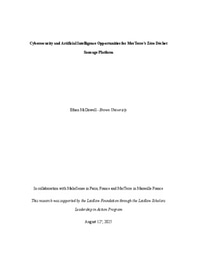Fighting Diffuse Waste in Marseille: A Leadership-in-Action Journey
Project Goals, Objectives, and Outcomes
This project began with the shared goal of supporting MerTerre, a Marseille-based NGO tackling diffuse abandoned waste through data-driven monitoring and partnerships with municipalities, eco-organizations, and local communities. Through the Laidlaw Leadership-in-Action program and with the coordination of MakeSense, I spent six weeks in Marseille contributing to MerTerre’s mission of fighting marine pollution with technical, policy, and engagement strategies. My work centered on three key outcomes: producing an international legislative review of diffuse abandoned waste laws, developing a report on how cybersecurity and artificial intelligence could strengthen MerTerre’s Zéro Déchet Sauvage platform, and drafting a community engagement strategy focused on improving MerTerre’s social media presence and long-term volunteer mobilization. Together, these deliverables aimed to bridge the technical, legal, and social dimensions of marine conservation.
Who are the Stakeholders?
From the start, the project required collaboration across multiple stakeholders. MakeSense guided our cohort through the transition to life and work in Marseille, offering coaching and leadership training that grounded our day-to-day efforts. At MerTerre, Isabelle Poitou, the founder, and Teo Juričev, the data project manager, provided direction and mentorship. Isabelle’s vision for structural change and Teo’s technical guidance shaped how I approached both my legislative review and my exploration of technological tools for waste monitoring. Beyond MerTerre, stakeholders included local municipalities around Marseille, eco-organizations such as Citeo, and global actors engaged in treaty processes like the United Nations Ocean Conference. My fellow interns were also central stakeholders, since much of our work was collaborative, and the outcomes were stronger because we continuously built ideas together.
Leadership Experience
The leadership lessons from this project were embedded not just in the outputs, but in the process. I learned from observing Isabelle’s ability to lead with both expertise and empathy, and from Teo’s example of collaborative leadership grounded in technical mastery. From MakeSense coaches Emma Lempereur and Jade Thiebaut, I learned the value of structuring conversations to balance vision with pragmatism. Personally, I practiced leadership by ensuring my peers felt included in technical discussions, translating complex ideas about data structures or legislative frameworks into accessible terms. This balancing act between technical rigor and inclusive collaboration was one of the most important leadership skills I developed in Marseille.
What was the Impact?
The impact of this project can be seen across three levels. First, the legislative report offered MerTerre a comparative analysis of France, the EU, Japan, and Canada, as well as insights from ongoing treaty negotiations in Geneva and outcomes from the United Nations Ocean Conference in Nice. This report highlighted the absence of diffuse waste as a legal category, while identifying specific levers such as extended producer responsibility, deposit return schemes, and microplastic regulation that could inform MerTerre’s advocacy.
Second, the cybersecurity and AI report provided a new angle for MerTerre by exploring how technological tools could enhance the reliability and scalability of the Zéro Déchet Sauvage platform. The report outlined how AI could automate data categorization and visualization, while cybersecurity safeguards could protect the integrity of the crowdsourced database from manipulation or loss. This perspective placed MerTerre in dialogue not only with policymakers but also with the broader digital ecosystem shaping environmental monitoring.
Finally, the community engagement report focused on MerTerre’s social media strategy. By benchmarking organizations like Ocean Conservancy and Clean My Calanques, I identified opportunities for MerTerre to spotlight individual volunteers, engage youth programs, and implement consistent posting schedules. The recommendations combined short-term adjustments (such as scheduling tools and content templates) with long-term strategies for building a more visible and engaged digital community. This social media work complemented the policy and technical deliverables by ensuring that MerTerre’s message reaches and mobilizes diverse audiences.
The Long Term and Sustainability
What gives this work staying power is how the deliverables fit into MerTerre’s structural vision. The legislative review arms the organization with evidence-based arguments for engaging French and European policymakers, while also tying local waste monitoring to global treaty frameworks. The cybersecurity and AI report opens the door to future partnerships with developers, data scientists, or funders interested in building resilient environmental tech infrastructure. The social media strategy provides a practical roadmap that MerTerre’s staff can continue to apply, helping them reach more volunteers, partners, and funders.
For me personally, the project reinforced the idea that technical skills in computer science can and should be applied to social and environmental challenges. I learned how to translate abstract technical concepts into actionable recommendations for a nonprofit context, and how to integrate data and technology into broader advocacy frameworks. These are skills I will carry into future projects, whether in AI, cybersecurity, or environmental tech!



Please sign in
If you are a registered user on Laidlaw Scholars Network, please sign in